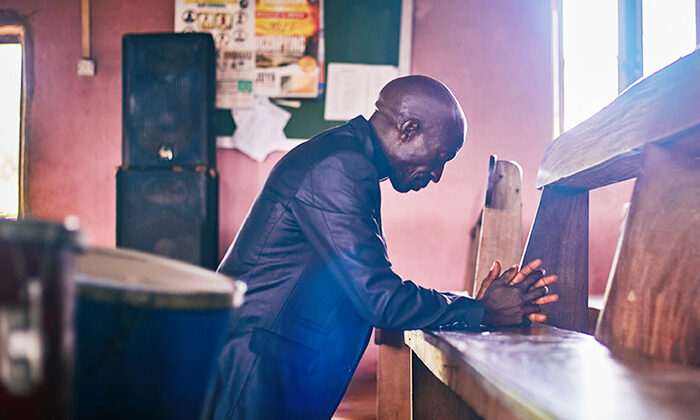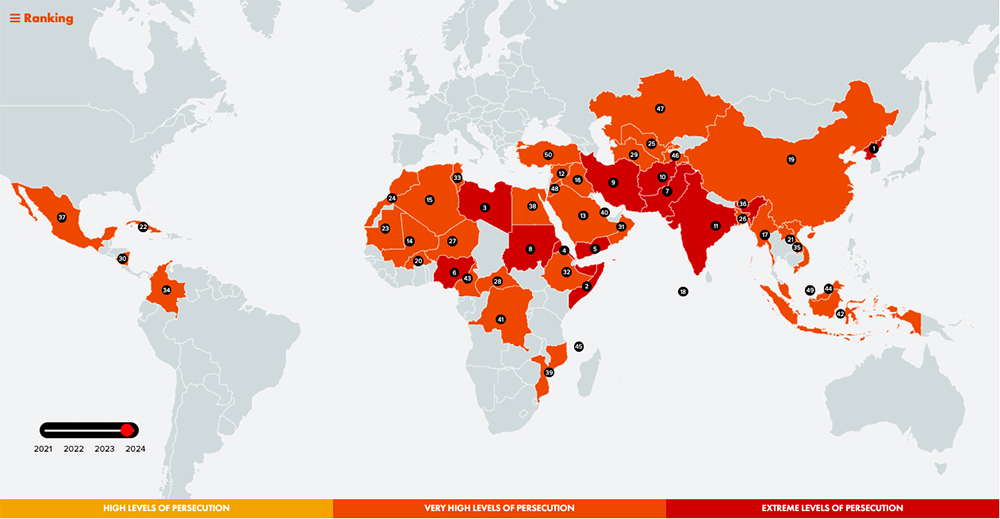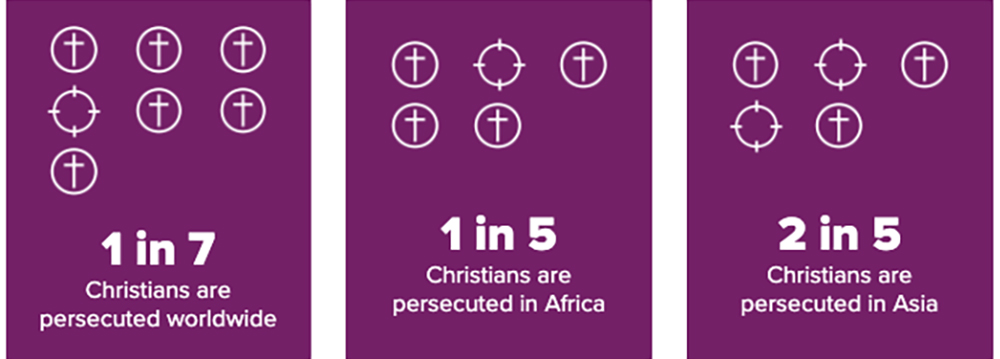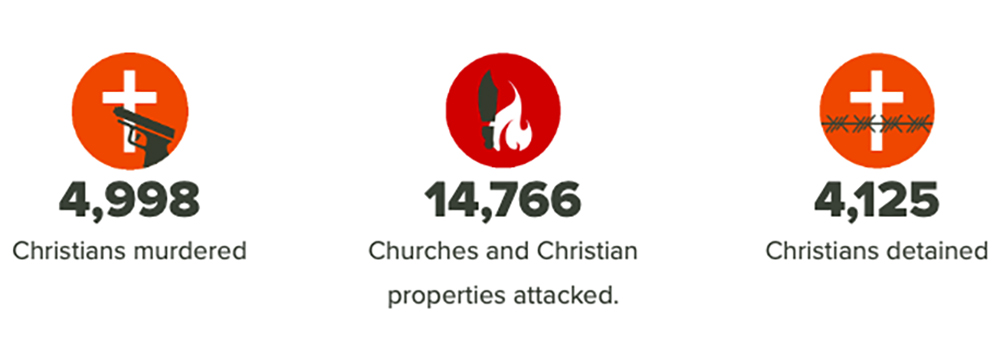
One in seven Christians worldwide face high levels of persecution and discrimination for their faith – that’s 365 million of our brothers and sisters.
The statistic comes from the latest World Watch List, an annual ranking of the countries where it’s most dangerous to be a Christian.
But it doesn’t tell the whole story. Five years ago, the figure was one in nine. In the past year alone, the number of persecuted believers has risen by about five million.
Put simply, the persecution of Christians is worsening.
One of the reasons that it’s getting worse is because the church is growing. In the most hostile of environments, it continues to thrive. More than anything, it’s a testament to the power of the gospel and the eternal truth that “God’s word is not chained” (2 Timothy 2:9). But it’s also because the global church is standing with its most vulnerable members. It’s what family does.
However, as the findings of the latest report show, this help cannot waiver. Indeed, your prayers and support are arguably more crucial than they ever have been.

Extremists exploit instability in Africa
A key trend is growing violence in sub-Saharan Africa. The region accounts for some 90 per cent of the estimated 5,000 believers killed for their faith worldwide, with the highest number of Christians killed being in Nigeria (4,118).
The last year has seen a sharp rise in attacks on churches and Christian homes and buildings in places like Ethiopia and Burkina Faso. This explains why the number of countries in sub-Saharan Africa recording extremely high levels of violence has risen by two to 15.
The main driver of this is Islamic extremists capitalising on regional instability. In places like Mali, Burkina Faso, Nigeria, Mozambique and Somalia, military coups and other fractures in governance and security have enabled militancy to flourish. Because of their faith, Christians are affected disproportionately.
Even when not specifically targeted for their faith, Christians caught up in regional conflicts – such as in Sudan and Ethiopia – are deemed soft targets who can be attacked with impunity.
Foreign influence bolsters autocratic regimes
There’s another threat emerging in sub-Saharan Africa – and its origins are in China and Russia.
African governments are spending £800 million per year on surveillance technology, mostly to strengthen the capabilities of autocratic governments. The main exporter is China, a country whose use of sophisticated surveillance technology is synonymous with repression of religious freedom (and one of the main reasons it’s number 19 on the World Watch List).
Meanwhile, the Wagner Group – a private military contractor with reported connections to the Russian government – has been gaining a foothold in the region. The group is known for its ruthless activities in countering Islamic extremism, with civilians often deemed expendable. It has been increasingly active in countries including Burkina Faso and Mali, where speaking out against their activities is near impossible and even life-threatening.
Given Christianity’s links to the West, believers in the region – particularly those from Protestant groups – fear the repercussions of being associated with Western opposition to Wagner’s actions.
The other crucial issue here is the Wagner Group’s manipulation of key economic sectors in the region, notably mining. This threatens to bring yet more instability to sub-Saharan Africa – and that’s the last thing Christians need.

Unprecedented attacks on churches
Two-thirds of all attacks and closures of churches and public Christians properties were in China, where tightening religious laws and intrusive surveillance have forced many churches to splinter into a myriad of small, less visible groups. Even many of those regulated by the state have been closed and amalgamated with larger churches.
Elsewhere, in Algeria, only four of the 46 churches affiliated with the country’s Protestant umbrella organisation remained open in 2023 – and it’s unlikely it will stay that way for long.

Christians squeezed out of the Middle East and North Africa
The story for our brothers and sisters in the Middle East and North Africa remains a sadly familiar one.
The situation in Syria has worsened, enough to now make it a country where believers face extreme persecution. Ongoing conflict, pressure from the Islamic majority, the influence of extremist groups and a collapsed economy contribute to the vulnerability of Christians. Last year’s devastating earthquakes only exacerbated this.
In Iraq, waning political influence and an increase in incidents of incitement of hatred against believers has increased pressure on the country’s embattled Christian minority. Another issue is Turkey’s military incursions in north, where most Iraqi Christians live, which is preventing believers from returning to their homes.
Meanwhile, Libya has climbed to third on the World Watch List, due to an increase in violence against Christians. And in Tunisia, pressure on Christians continues to grow as President Kais Saied’s rule drifts into authoritarianism.
What’s the good news?
In Mali, changes to the country’s constitution – which includes recognition of the country’s Christian minority – were approved in a referendum. It’s seen as a step towards elections in 2024 and a return to civilian rule and stronger governance.
In Karnataka State, India, the Hindu nationalist BJP were dislodged by the Congress Party, who have promised to revise or withdraw the ‘anti-conversion laws’ that are often used to target Christians.
Despite an increase in hostility in Sri Lanka, Open Doors partners say that church closures have been prevented because of teaching given to pastors on how to stand up for their rights.
Meanwhile, in North Africa and the Arabian Peninsula, the online sphere is increasingly a place for people to encounter Jesus and access fellowship and discipleship.
And in Mexico, the translation of religious law into Tzotzil – a widely spoken indigenous language – was published, with support from Open Doors. It will enable believers to better understand their rights amid persecution.
Dare to declare
The statistics and stories that highlight rising persecution are sobering, but they point to a greater reality: the church is growing.
A big riser in this year’s list is Laos, jumping ten places to 21st, due to a spike in violence against Christians. “In all my years working as a researcher, I never saw a clearer connection of a growing church with growing opposition, resulting in higher scores,” said a researcher. “I find it comforting that the biblical verses predicting this connection are still true.”
It’s a similar story worldwide – one that began around 2,000 years ago, when persecution scattered the early church because of the impact of the gospel. Wherever believers settled, the church continued to grow.
“Now I want you to know, brothers and sisters, that what has happened to me has actually served to advance the gospel,” Paul wrote in Philippians 1:12, before adding his courage has enabled others ‘dare all the more to proclaim the gospel without fear’ (1:14).
As we remember and support our persecuted family, may Paul’s words be true of us, too.

